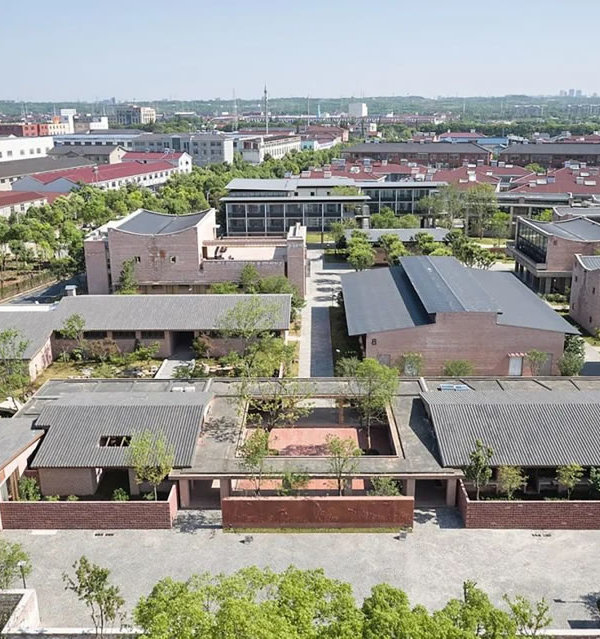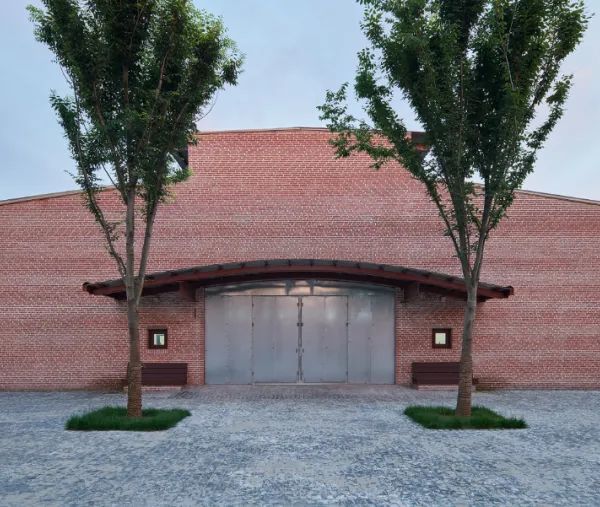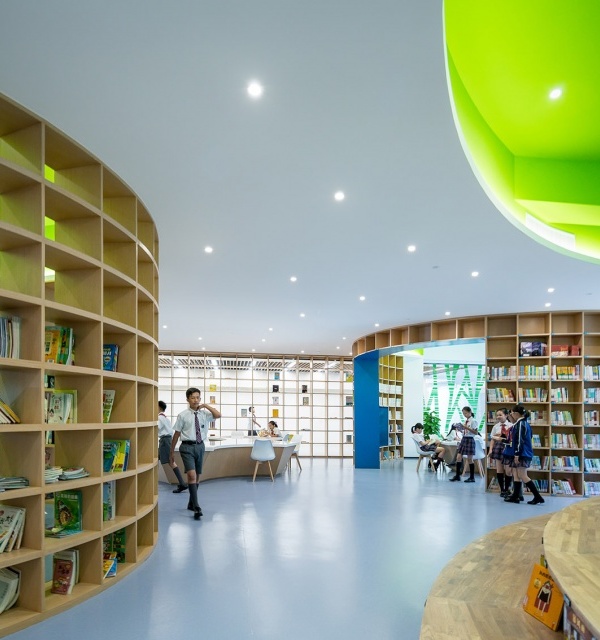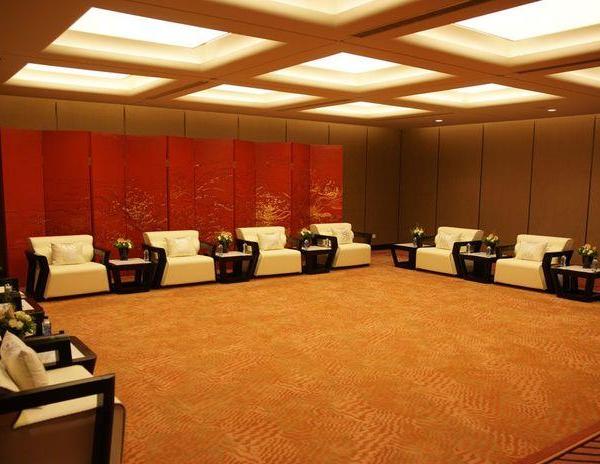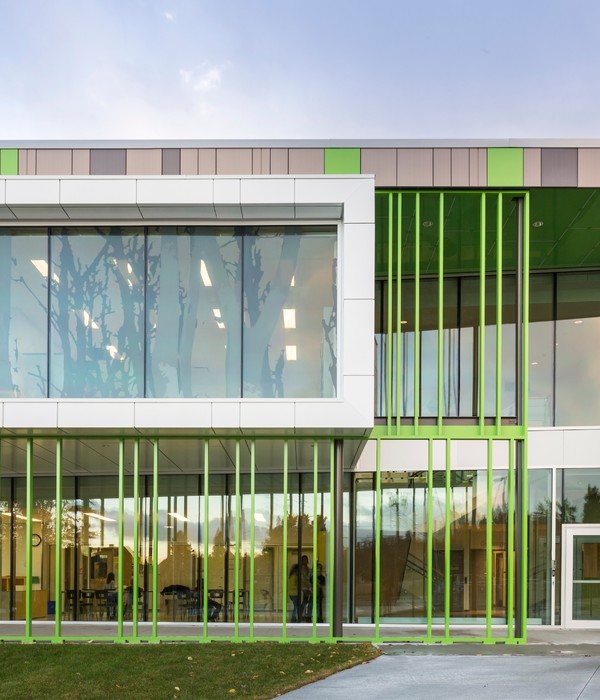© Didier Boy de la Tour
(迪迪埃·德拉巡演)
架构师提供的文本描述。Pau et Pay de l‘Adour 大学 (UPPA) 校园以建筑师 AndréGrésy 为标志,沉浸在树木茂密的土地中,与其环境有着牢固的关系。为了符合大学制定的项目,协调不同的活动,并在数量和质量方面提升物质手段和房地产,建设法罗法伊特、经济和管理学院-- 法律、经济和管理学院-- 经济系。
Text description provided by the architects. The campus of University of Pau et Pays de l’Adour (UPPA), bearing the hallmark of its architect André Grésy, is immersed in wooded grounds and has a strong relationship with its environment. In order to comply with the project developed by the university, to coordinate the different activities, and to upgrade - in terms of quantity and quality - the material means and real estate, the building of the Faculté de Droit, Economie et Gestion - Faculty of Law, Economics & Management - and of the Institut d’Administration des Entreprises - Institute of Business Administration - is reorganized, and an extension of the research centre is created.
© Didier Boy de la Tour
(迪迪埃·德拉巡演)
© Didier Boy de la Tour
(迪迪埃·德拉巡演)
研究领域不断变化。因此,帕特里克毛格开发的项目是开放式的。
The world of research is constantly changing. Therefore the project developed by Patrick Mauger is open-ended. © Didier Boy de la Tour
(迪迪埃·德拉巡演)
© Didier Boy de la Tour
(迪迪埃·德拉巡演)
在里面,入口大厅大大扩大了。为定向提供了便利。循环流是分开的。新的垂直循环路径允许在楼层之间建立更好的连接,通过调整它们,可以创造未来的扩展。这些标记强烈的建筑空间使用户很容易找到他们的方位,并为交流创造有利的条件。在南面,在现有的纵向建筑上增加了一个全高玻璃的延伸部分,将已开发的建筑延伸到地面,以适应该方案的功能。一条宽阔的中央楼梯绕着一片空隙,沐浴在头顶的灯光下。楼梯是一个真正的白色混凝土雕塑作品,是该方案的脊柱,设置在一个红色混凝土楼梯井,赋予它的力量,让所有用户可以立即找到他们的方位。它可以从公共区域进入,供研究教师、研讨会和论文介绍,也可以从博士学校的行政办公室进入,并在文件区和研究中心办公室的交界处通往上层。
Inside, the entrance lobby is considerably enlarged. Orientation is facilitated. Circulation flows are separated. New vertical circulation routes allow better connections between floor levels, and it will be possible to create future extensions by adapting them. These strongly-marked architectural spaces make it easy for users to find their bearings and create favourable conditions for communication.
On the south, an extension with full-height glazing is added onto the existing longitudinal building, extending the developed architecture into the grounds, to accommodate functions of the programme. A wide central stairway winds around a void bathed in overhead lighting. The stairway is a real sculptural work in white concrete, and is the spinal column of the scheme, set in a stairwell of red concrete, which gives it its force and allows all users to immediately find their bearings. It is accessible from communal areas for research teachers, seminars and thesis presentations, and from the administration offices of the doctoral school, and it leads to the upper floor levels, at the junction of the documentation areas and the research centres’ offices.
© Didier Boy de la Tour
(迪迪埃·德拉巡演)
在外面,外观被修改和现代化。以初始建筑为特征的瓷砖檐的水平带被调整。随机混合了 5 种颜色的屋顶瓷砖,包括漆包和非漆包,使新建筑的外墙充满活力,便于识别。这些新的瓷砖檐盖外壳可伸缩倾斜遮阳百叶窗,这允许个性化的控制日光进入和太阳增益的最佳热控制。
Outside, the façade is revised and modernised. The horizontal bands of tiled canopies, which characterise the initial architecture, are adapted. A random mix of 5 colours of roof tiles, both enamelled and non-enamelled, livens up the façades of the new building, facilitating identification. These new tiled canopies cover housings for retractable tilting sun-shade louvers, which allow personalised control of daylight admission and optimal thermal control of solar gain.
使用对生态负责的生物材料-- 外部和内部木材细木工,包括木地板、木羊毛外保温材料和陶瓷砖-- 有助于限制新建筑的碳足迹。其他活动装置和措施补充了有关环境方法的工作:从所有空气处理单元回收能源、增加夜间通风、房舍管理系统和双流通风以减少能源消耗和优化自然采光。
The use of bio-sourced ecologically responsible materials - external and internal wood joinery, including parquet wood strip flooring, wood wool external insulation, and terracotta tiles - helps to limit the new building’s carbon footprint. Other active devices and measures complement the work on the environmental approach: energy recovery from all air handling units, additional night-time ventilation, a BMS - building management system - and double flow ventilation to reduce energy consumption, and optimised natural daylighting.
© Didier Boy de la Tour
(迪迪埃·德拉巡演)
Product Description
陶瓷砖-- 经修订的、现代化的、带有陶土屋顶瓷砖的外墙
Terracotta tile - A revised, modernised façade with terracotta roof tiles
现有建筑的特点是木材支撑框架的水平带,上面覆盖着弗拉姆红色的陶土平面砖。在缺乏自然采光的内部空间,它们提供遮阳和遮阳的保护。为了弥补这一不足,并改善日光的渗透,扩建的新外墙达到了重新解释现有建筑的目的,同时改进了它并使其形象现代化。
The existing architecture is strongly marked by the horizontal bands of timber support frames covered with flammé red terracotta flat tiles. They provide protection from the sun and natural shade in the internal spaces which suffer from a lack of natural daylighting. To make up for this deficit and to improve the penetration of daylight, the extension’s new façades meet the aim of reinterpreting the existing architecture, while improving it and modernising its image. © Didier Boy de la Tour
(迪迪埃·德拉巡演)
Wienerberger 公司生产的 Aleonard Koramam 型的近 25,500 个兵马俑屋顶瓦是覆盖新檐篷所必需的:
Nearly 25,500 terracotta roof tiles, of the Aleonard Koramic type made by Wienerberger, were necessary for covering the new canopies:
17 500 块非漆包屋顶瓷砖 (即 70%) 为弗拉姆红色,扩展了现有建筑的瓷砖;8 000 块漆包屋顶砖 (即 30%),有 4 种新颜色:蓝色、红色、黄色和黄色。
17,500 non-enamelled roof tiles (i.e., 70%) of flammé red colour, extending the tiles of the existing building, 8,000 enamelled roof tiles (i.e., 30%) with 4 new colours: blue, red, yellow and yellow ochre. © Didier Boy de la Tour
(迪迪埃·德拉巡演)
这 5 种颜色的随机混合在新建筑的外墙上活跃,并允许他们识别。每块 25,500 块 10 厘米 x 20 厘米的瓷砖被固定在金属框架上。所有尺寸为 3 米 x2.15 米的框架都是按照木材窗框 (1 米 x2 米) 的立面网格放置的,同时保持现有檐篷的倾斜和排列。根据不同的曝光量,固体和空隙的作用使新部件的外观变得活跃起来。太阳盾牌是逐渐穿孔的,这取决于它们离现有建筑有多近:它们在东北和西北与现有建筑相连时密度更高,而在南部则不那么密集,以突出和加强新的研究中心。
A random mix of these 5 colours livens up the façades of the new building and allows their identification. Each of the 25,500 made-to-measure 10 cm x 20 cm terracotta flat tiles is clipped to the metal frames. All the frames, measuring 3m x 2.15m, are placed according to the façade grid of the timber window frames (1m x 2m) while maintaining the inclination and alignment on the existing canopies. According to the varying exposure, a play of solids and voids enlivens the façades of the new parts. The sun-shields are gradually perforated, depending on how close they are to the existing building: they are more dense on the north-east and north-west to link to the existing building, and less dense on the south to highlight and enhance the new research centres. © Didier Boy de la Tour
(迪迪埃·德拉巡演)
随着这一穿孔,白天更多地进入阅览室春季,秋季和冬季。在位于周边的办公室的西面和东面,可伸缩的倾斜遮阳百叶窗被固定在檐篷的结构上。他们过滤阳光,并允许个性化的控制白天的录取,根据太阳的路线。
With this perforation, daylight enters the reading rooms more abundantly in the spring, autumn and winter. On the west and east façades of offices located around the perimeter, retractable tilting sun-shade louvers are fastened to the structure of the canopies. They filter sunlight and allow personalised control of daylight admissions, according to the sun’s course.
新立面上的所有饰面都有多种颜色:
All facings on the new façades are in a variety of colours:
屋面平面砖 5 种,烘焙木 3 种,可伸缩外百叶窗 3 种,木材窗框上涂 3 种激光表面涂料。
5 colours of flat roof tiles, 3 colours of bakelized wood, 3 colours on retractable external blinds, 3 colours of lasure surface coating applied to the timber window frames.
校园里的每个人都可以看到这些外观材料的颜色组合,创造了大学的新形象。
These colour combinations of façade materials, which can be seen by everyone from the campus, create the new image of the university.
© Didier Boy de la Tour
(迪迪埃·德拉巡演)
Architects Architecture Patrick Mauger
Location Avenue du Doyen Robert Poplawski, 64000 Pau, France
Category University
Architect in Charge Bertrand Perreaux, Ludovic Le Bras
Area 3600.0 sqmProject Year 2015
Photographs Didier Boy de la Tour
{{item.text_origin}}

